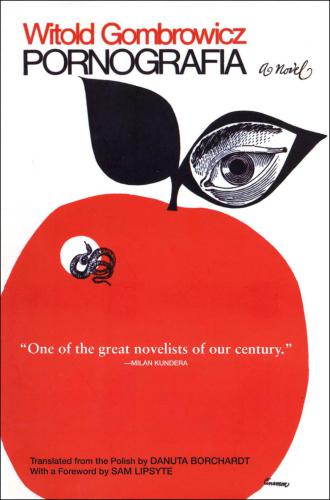
Pornografia
A Novel
- اطلاعات
- نقد و بررسی
- دیدگاه کاربران
نقد و بررسی

Starred review from July 20, 2009
Gombrowicz's strange, bracing final novel probes the divide between young and old while providing a grotesque evocation of obsession. While recuperating from wartime Warsaw in the Polish countryside, the unnamed narrator and his friend, Fryderyk, attempt to force amour between two local youths, Karol and Henia, as a kind of a lewd entertainment. They become increasingly frustrated as they discover that the two have no interest in one another, and the games are momentarily stopped by a local murder and a directive to assassinate a rogue member of the Polish resistance. Gombrowicz connects these threads magnificently in a tense climax that imbues his novel with a deep sense of the absurd and multiplies its complexity. Gombrowicz is a relentless psychoanalyzer and a consummate stylist; his prose is precise and forceful, and the narrator's strained attempts to elucidate why he takes such pleasure at soiling youth creepily evoke authentic pride and disgust. Borchardt's translation (the first into English from the original Polish) is a model of consistency, maintaining a manic tone as it navigates between lengthy, comma-spliced sentences and sharp, declarative thrusts.

September 1, 2009
A fresh English version of the great Polish writer's 1960 novel about middle-aged dreams and youthful obliviousness, one of his best-known works.
Poland, 1943. Neither nature nor religion offers surcease from the Third Reich's grinding occupation. Intellectuals huddling together for warmth run through topics of conversation—"God, art, nation, proletariat"—as if counting down the last grains of sand in an hourglass. The narrator, Witold Gombrowicz, resolves to leave Warsaw to visit Hipolit, a landowner who's invited him and Fryderyk, another poseur who's attached himself to Witold, to his home in the countryside. No sooner have they arrived than the unlikely pair are smitten by Hipolit's teenaged daughter Henia and her childhood friend Karol. Or rather, they're smitten by the idea that these two young people belong together, even though Henia, who likes Karol perfectly well but has never thought of him as a potential lover, is about to announce her engagement to Vaclav Paszkowski, a rising attorney from nearby Ruda. In cryptic conversations and memorably febrile internal monologues, the two men share their fantasies about the young people and scheme to make them a couple. But nothing comes of this folieà quatre until Vaclav's mother is suddenly stabbed to death, and a resistance fighter who's come to the end of his courage announces his intention of abandoning the cause and going back home. Goaded by a series of unsigned notes that play on their already considerable paranoia, Witold and Fryderyk hatch a monstrous new plan to bring Henia and Karol together. Aiming for greater fidelity to Gombrowicz's original than the 1966 translation done from a French version, Borchardt, who won a prize for her English rendering of Ferdydurk (2000), spins out a web of words that vibrate with unholy energy.
Les liaisons dangereuses updated by Kafka. A remarkably ugly, even repellent little tale—but in a good way.
(COPYRIGHT (2009) KIRKUS REVIEWS/NIELSEN BUSINESS MEDIA, INC. ALL RIGHTS RESERVED.)

September 1, 2009
Originally published in 1966 and previously translated into English in 1978, this existential novel is set in occupied Poland during World War II. Narrator Witold and his enigmatic companion, Fryderyk, two intellectuals with ties to the underground resistance, find themselves holed up at a friend's farm. The two men quickly become obsessed with the farmer's teenage daughter and a young farmhand with whom she has been friends since childhood and attempt, for their own voyeuristic amusement, to entice the two into beginning a sexual relationship. Eventually, their games are derailed by, and possibly contribute to, a series of bizarre and disastrous incidents. Each event is overanalyzed by the narrator, allowing Gombrowicz to reveal his underlying concern with the "blind elemental forces" that determine human events: war, love, religion, sin, and desire. VERDICT Philosophical, sensual, and occasionally jarring, Gombrowicz's writing swirls with strange meanings. His singular style may deter casual readers, but those who brave a few chapters will find themselves hypnotized. Borchardt's translation, from the original Polish, returns a clarity and impact to the text that had been lost in the earlier two-step translation from the French. Especially recommended for fans of Sartre, Camus, and similar authors.Forest Turner, Suffolk Cty. House of Correction Lib., Boston
Copyright 2009 Library Journal, LLC Used with permission.




دیدگاه کاربران